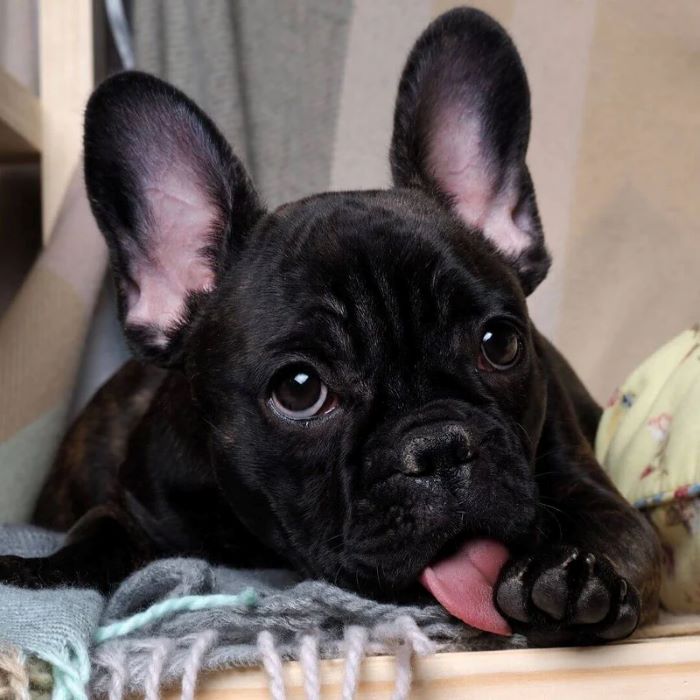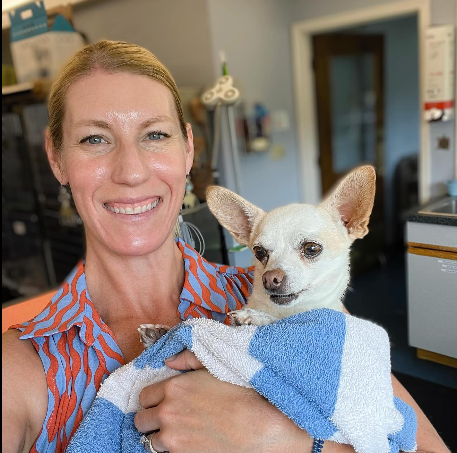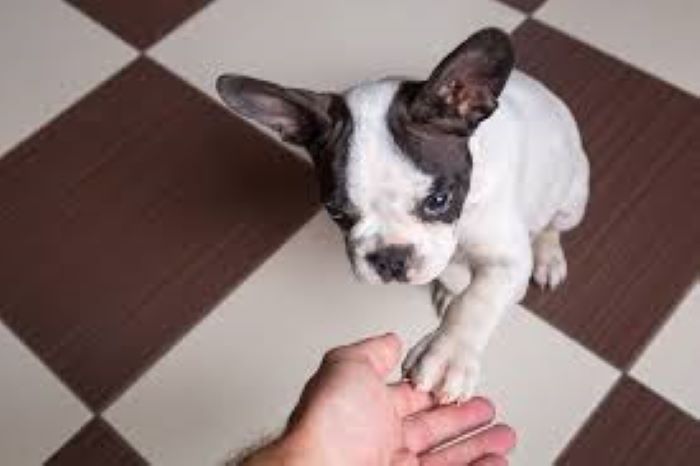In addition to raising concerns about your pet’s comfort, excessive paw licking in French Bulldogs may also be an indication of possible underlying health problems. It is imperative that you take swift action in order to guarantee the general happiness and well-being of your Frenchie.
Even while it may seem harmless, paw licking can frequently be an indication of more serious issues that are bothering your dog. Anxiety, skin irritations, and allergies are a few prominent causes of this habit. Finding the source of the behavior is essential to breaking it and improving your Frenchie’s quality of life.
We will cover a wide range of tactics and fixes in this in-depth article to assist you in ending your French Bulldog’s incessant paw licking. Your cherished Frenchie will live in a happier and healthier environment if you address the underlying problems and encourage proper paw care. We will investigate a range of approaches, including working with a veterinarian and applying behavior modification strategies, all aimed at providing your pet with comfort and relief while resolving the paw-licking problem at its root.
Table of Contents
Reasons Why Do French bulldog Lick Their Paws?

French Bulldogs have won the hearts of dog lovers everywhere with their endearing appearance and endearing dispositions. Although these small dogs are great friends, owners may occasionally be perplexed by their peculiar habits. The habit of French Bulldogs licking their paws is one example of this behavior. You’re not alone if you’re a proud owner of a Frenchie and have ever questioned why your pet performs this amusing behavior. We’ll examine the numerous explanations for this behavior in this post, illuminating the possible sources and determining whether it warrants further investigation. The first step to making sure your French Bulldog is happy and healthy is to figure out why they lick their paws..
Grooming
It’s true that French Bulldogs are renowned for their natural hygiene and grooming habits. They use their paw-licking habit as an essential part of their daily grooming regimen. Their attempt to keep themselves clear of dirt and debris is frequently a direct result of their need for cleanliness.
When French Bulldogs go outside or even inside, their paws may come into contact with a range of surfaces and materials. When they roam around the house, play in the yard, or stroll on the sidewalk, their paws may pick up dust, dirt, and other particles. In keeping with their naturally tidy disposition, French Bulldogs lick their paws to maintain maximum cleanliness.
Food Allergies
Dogs who have food allergies may lick their paws in an attempt to relieve the itching on their skin. Dogs who have dietary allergies frequently react to grains, proteins, and specific ingredients in commercial dog food.
Skin Irritation
It is well known that dermatitis and contact allergies can cause a range of uncomfortable symptoms, including redness, irritation, and itching. Dogs frequently turn to licking their paws as a basic and instinctive means of relieving themselves of these upsetting feelings.
Dog dermatitis can result from environmental triggers or dietary allergies, causing skin inflammation and pain. On the other hand, contact allergies are caused by direct contact with irritants like particular plants, chemicals, or materials and can cause localized skin reactions. The skin on the paws is particularly sensitive to these irritations in both play and walking situations because it is exposed to so many different surfaces and materials.
Anxiety or Boredom
French Bulldogs, like many other dogs, have been known to lick their paws in times of anxiety, stress, or boredom. This kind of behavior can offer a soothing diversion.
Paw Injuries in French Bulldog
Dog paw injuries, such as cuts, scrapes, or splinters, can cause excruciating pain and discomfort. Dogs frequently have an innate tendency to lick the injured area in order to reduce pain or cleanse the wound in reaction to these unpleasant feelings.
The delicate nerve endings in the skin of a dog’s paw can cause pain and discomfort when it is injured. Licking is a normal, quick reaction that offers some comfort. Saliva can help clean the wound to stop infection because it has some mild antiseptic qualities. Furthermore, licking can encourage the body’s natural painkillers, endorphins, to be released, providing the injured dog with some momentary comfort.
Licking can be a helpful and self-soothing reaction to wounds, but it can also have negative effects if done excessively or repeatedly. It might impede the body’s natural healing process and possibly irritate or introduce new bacteria to the area. In these situations, it’s critical for pet owners to closely monitor their dog’s wound, administer appropriate first aid as needed, and seek veterinary attention if the injury is severe or doesn’t seem to be getting better.
Knowing that paw licking may be a pain-driven reaction to wounds emphasizes how crucial it is to provide your pet with timely and appropriate care in order to promote a quick and painless recovery.
Yeast Infection
Dog paw yeast infections can be extremely uncomfortable and bothersome. In these situations, our dog friends’ natural reaction to reduce the irritation and discomfort brought on by the infection is to lick themselves excessively.
Yeast infections frequently cause paw itching, redness, and inflammation. The spaces between toes and in the folds of skin are examples of warm, moist environments where the yeast, which is typically Malassezia, can grow. As the illness progresses, patches of itching and irritation may develop on the paw pads and in the webbing between the toes. These sensations may cause the dog great distress, and in an attempt to soothe themselves, they may lick their paws repeatedly.
In this situation, licking acts as a self-soothing technique. Licking produces saliva, which cools and moisturises the injured areas, giving a momentary sense of relief. Furthermore, licking may provide a momentary reprieve from the dog’s discomfort and itching by diverting their attention from the touch.
Pain
If a dog is in pain or uncomfortable somewhere else on their body, they might lick their paws. This conduct may indicate a more significant underlying problem.
Behavioral Problems
Dogs that lick their paws excessively may occasionally develop a habit or compulsive behavior. In these situations, it might be connected to anxiety or other behavioral problems that need to be addressed.
Dogs can form routines or habits in reaction to stress, anxiety, or boredom, just like people can. One such habit that some dogs develop as a coping method is compulsive paw licking. In moments of emotional upheaval, it gives them a sense of security and control. What started out as a response to a particular stressor can eventually become a habitual behavior that continues even in the absence of the original stressor.
Parasitic infestation
Dogs with parasites such as ticks or fleas may suffer from severe agony and itching. When these parasites are present, a French Bulldog may lick their paws excessively to try to relieve the irritation and itching the parasites are causing.
It’s imperative to routinely apply preventive measures, such as flea and tick control, to avoid infestations that could lead to paw licking and other health issues for your French Bulldog. If you suspect your dog has a parasite infestation, consult your veterinarian to determine the best course of action for treatment and prevention.
How to stop your Frenchie from this paw-licking behavior?
When French Bulldogs (Frenchies) lick their paws excessively, it can indicate a number of underlying problems, including allergies, skin irritations, or anxiety. Addressing the underlying cause is crucial to putting an end to this behavior. The following actions can assist you in dealing with your Frenchie’s paw-licking behavior:
1. Consult with a Veterinarian
To rule out any medical concerns, see a veterinarian as soon as possible. Paw licking can result from various skin conditions, allergies, and infections. Tests can be carried out by your veterinarian to find any underlying health issues.
2. Allergies
Your veterinarian might advise allergy testing and treatment if allergies are the problem. Medication, dietary modifications, and environmental changes can all be used to manage allergies.
3. Check for Skin Irritations
Examine your Frenchie’s paws for indications of redness, irritation, or hot spots. Make sure their paws are clean and clear of debris because sharp objects can hurt them.
4. Maintain Proper Hygiene
Make sure your Frenchie’s paws are dry and clean. Use a moist cloth to wipe them down frequently to get rid of allergens, debris, and irritations. Make sure to cut their nails to avoid discomfort from ingrown nails.
5. Use a Cone or E-Collar
Your veterinarian might advise using a cone or an Elizabethan collar (e-collar) to temporarily block access to the paws if your Frenchie’s paw-licking is hurting the animal.
6. Provide Distractions
Paw-licking may occasionally indicate boredom or nervousness. Make sure your Frenchie receives toys, playtime, and exercise to keep him or her mentally and physically stimulated. Toys with interactive features can help keep them busy.
7. Create a Calm Environment
Lessen tension and worry in your Frenchie’s surroundings. To make them feel safe, create a welcoming and secure environment and stick to a regular schedule.
8. Behavior Modification
– Consider using positive reinforcement techniques to reward your Frenchie when they refrain from paw-licking. Use treats and praise to reinforce good behavior.
9. Consult with a Canine Behaviorist
Seeking advice from a qualified canine behaviorist or trainer can help address persistent paw-licking behavior if basic training is ineffective. They can offer targeted guidance and effective techniques for resolving the issue.
10. Be Patient
It may take some time to train a dog to behave differently, so be persistent and patient. Keep an eye on your Frenchie’s development and modify your strategy as necessary.
Working closely with your veterinarian will help you identify the underlying cause of your Frenchie’s paw-licking behavior and create a customized treatment plan for it. Depending on the particular requirements and state of your dog, they can offer tailored advice.
Conclusion
See a vet to rule out any underlying health issues before trying to stop your Frenchie’s excessive paw-licking habit. Handle any skin rashes, allergies, or infections as directed by your veterinarian. to keep oneself clean, create a calm environment, provide distractions, and assist people in feeling less stressed and bored. You can help yourself reduce this behavior over time with patience, consistency, and behavior modification techniques. Together with your veterinarian and, if necessary, a certified professional dog behaviorist, develop a customized plan for your Frenchies.

Dr. Allison Kramer is a seasoned veterinarian with a Master’s degree in Animal Behavior and over 10 years of experience specializing in canine health and behavior. Her expertise in positive reinforcement training and holistic care enhances the well-being of dogs and fosters strong pet-owner relationships. For expert advice and valuable insights, follow Dr. Kramer on Instagram @dr.allisonkramer.





